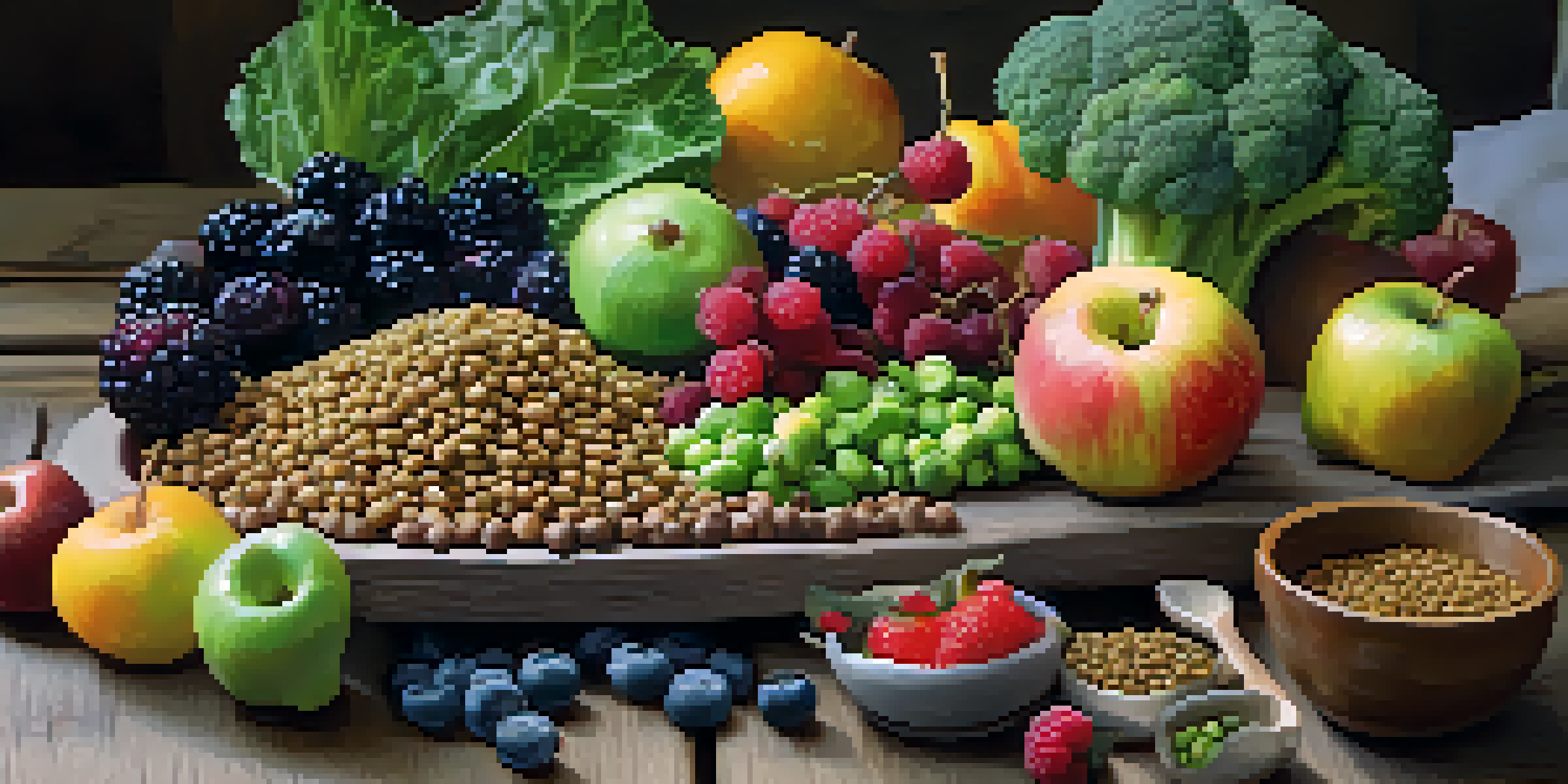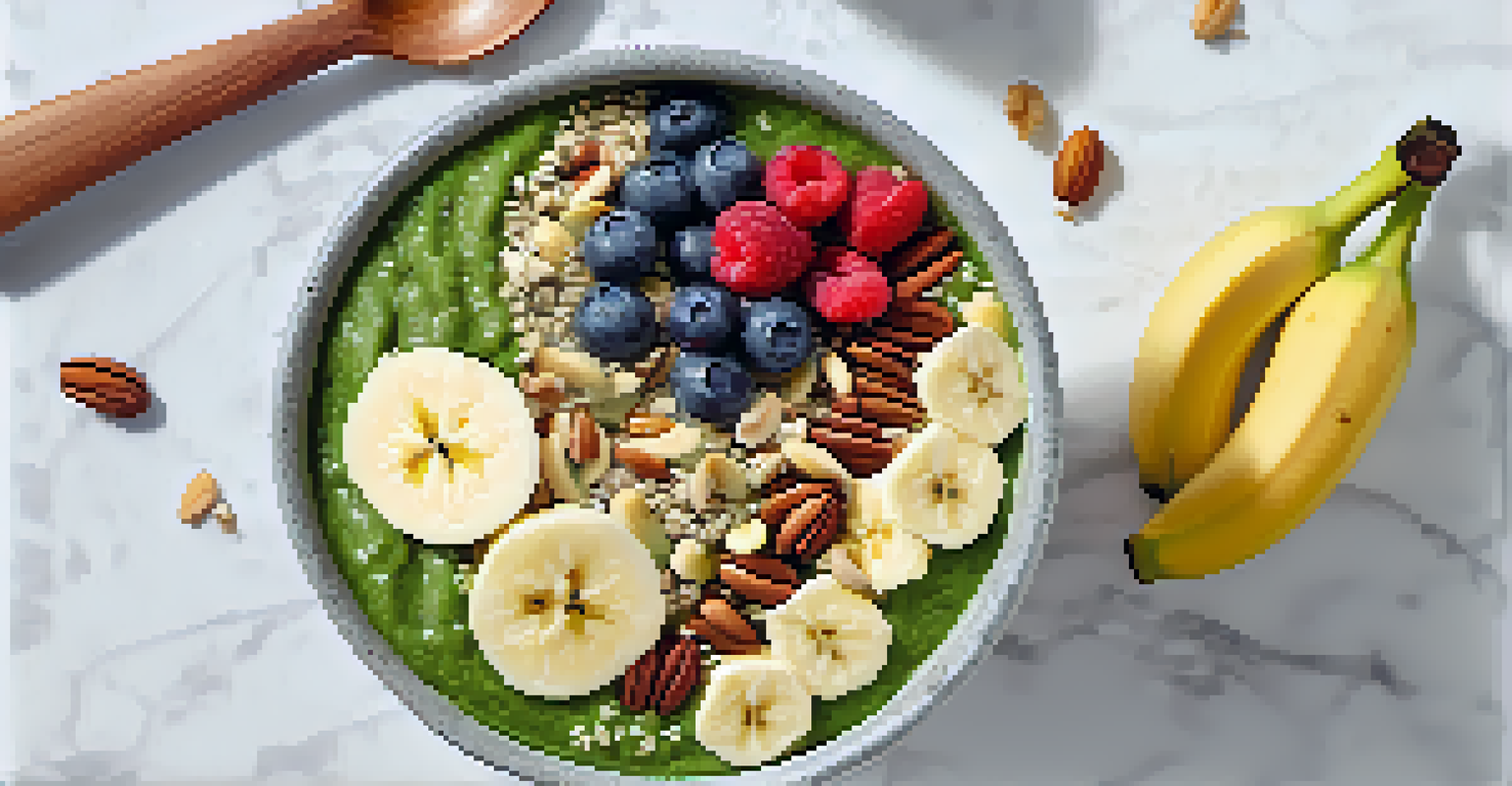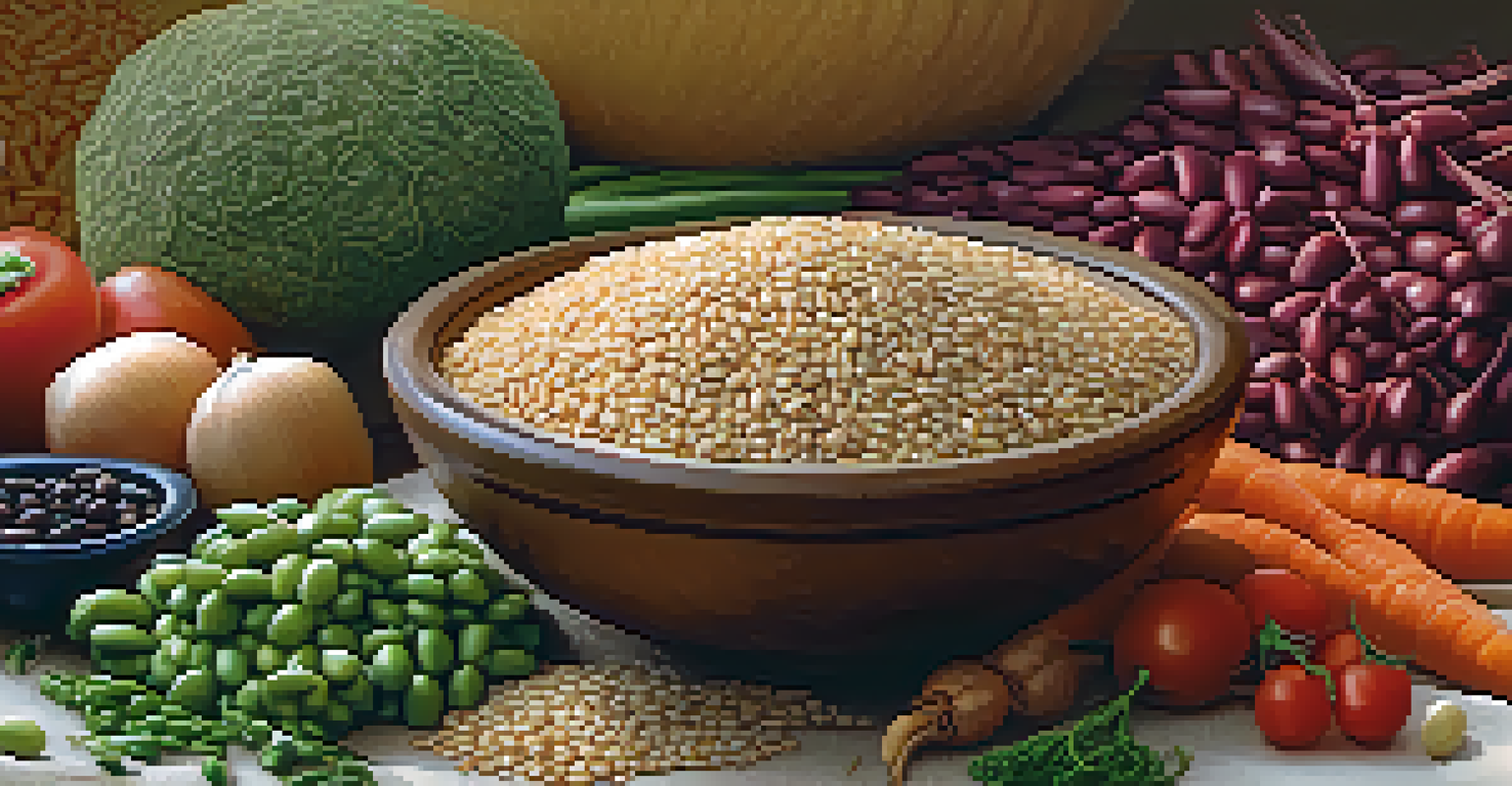The Role of Fiber in a Vegan Diet for Digestive Wellness

What is Fiber and Why is it Important?
Fiber is a type of carbohydrate that the body can't digest. Unlike sugars and starches, it passes through the stomach and intestines relatively intact. This unique characteristic is crucial because it helps regulate digestion and maintain gut health.
Eating more fiber is one of the easiest ways to improve your diet.
There are two main types of fiber: soluble and insoluble. Soluble fiber dissolves in water and can help lower cholesterol levels, while insoluble fiber adds bulk to stools and aids in preventing constipation. Both types play a vital role in a balanced diet, especially for those following a vegan lifestyle.
Incorporating enough fiber into your diet can lead to numerous health benefits, including improved digestive health, better blood sugar control, and a reduced risk of chronic diseases. Understanding these benefits can motivate you to include more fiber-rich foods in your meals.
Sources of Fiber in a Vegan Diet
A vegan diet can be incredibly rich in fiber, thanks to its emphasis on whole plant foods. Fruits, vegetables, legumes, nuts, and whole grains are all fantastic sources of fiber. For instance, a cup of lentils contains about 15 grams of fiber, making them an excellent choice for a filling meal.

Fruits like berries, apples, and pears, and vegetables such as broccoli and Brussels sprouts, are also high in fiber. Incorporating these foods into your daily meals can help you easily reach your fiber goals. Plus, they come packed with vitamins and minerals that promote overall health.
Fiber is Key for Digestive Health
Incorporating different types of fiber into your diet promotes digestive wellness and can help prevent issues like constipation.
Whole grains like quinoa, brown rice, and oats are other excellent sources of fiber. They not only add variety to your meals but also contribute to a feeling of fullness, which can aid in weight management. This diversity in food choices makes it enjoyable to maintain a fiber-rich diet.
The Benefits of Fiber for Digestive Health
Fiber plays a crucial role in promoting digestive wellness by helping to regulate bowel movements. Insoluble fiber adds bulk to the stool and speeds up its passage through the gut, reducing the likelihood of constipation. This is especially important for those on a vegan diet, which can sometimes lack certain binding agents found in animal products.
The health of your gut is the foundation of your overall health.
Additionally, soluble fiber can help maintain a healthy gut microbiome. It serves as food for beneficial gut bacteria, leading to the production of short-chain fatty acids that are essential for intestinal health. A balanced gut microbiome can improve overall digestion and may even impact mental health.
Moreover, a high-fiber diet can help prevent digestive disorders such as diverticulitis and irritable bowel syndrome (IBS). By ensuring a consistent intake of fiber, you can support your digestive system and promote a more comfortable and efficient digestion process.
How Much Fiber Do You Need?
The recommended daily fiber intake varies by age and gender, but general guidelines suggest about 25 grams for adult women and 38 grams for adult men. However, many people fall short of these recommendations, especially if they don't consume enough fruits, vegetables, and whole grains.
To help meet these fiber goals, it's beneficial to gradually incorporate more fiber into your diet. This can prevent digestive discomfort that might occur when suddenly increasing fiber intake. Start by adding one or two high-fiber foods to your meals and progressively increase your intake.
Vegan Diets Are Fiber-Rich
A well-planned vegan diet can provide an abundance of fiber from fruits, vegetables, legumes, and whole grains.
Listening to your body is key. If you notice any digestive issues, such as bloating or gas, consider adjusting the amount of fiber you're consuming. Everyone's digestive system is unique, and finding the right balance is essential for your personal wellness.
Tips for Adding Fiber to Your Vegan Meals
Adding more fiber to your diet doesn't have to be complicated. Simple swaps, such as choosing whole grain bread over white bread or snacking on fruits and nuts instead of chips, can make a significant difference. These small changes can easily elevate your fiber intake without making drastic adjustments to your eating habits.
Another effective way to boost fiber is to incorporate legumes into your meals. Beans, lentils, and chickpeas are not only high in fiber but also versatile. You can add them to salads, soups, or even blend them into dips like hummus, making it easy to enjoy their benefits.
Lastly, consider blending fiber-rich ingredients into smoothies. Adding spinach, chia seeds, or oats can enhance the fiber content while keeping your drink delicious and nutritious. It’s a fun way to pack in nutrients without feeling like you’re compromising on taste.
Common Misconceptions About Fiber
One common misconception is that all fiber is the same, but, as mentioned earlier, there are two distinct types: soluble and insoluble. Each type has its own health benefits, and a balanced intake of both is essential for optimal digestive health. Understanding these differences can help you make informed dietary choices.
Another myth is that increasing fiber intake will automatically lead to digestive discomfort. While it’s true that a sudden increase can cause bloating or gas, these symptoms can often be mitigated by gradually introducing fiber-rich foods into your diet. A slow and steady approach allows your digestive system to adapt more easily.
Gradual Fiber Increase is Best
To avoid digestive discomfort, it's important to gradually add fiber-rich foods to your meals instead of making sudden changes.
Lastly, some people believe that a vegan diet is inherently low in fiber. This couldn't be further from the truth! With the abundance of plant-based foods available, a vegan diet can be one of the richest in fiber, supporting gut health and overall wellness.
Conclusion: Embracing Fiber for Digestive Wellness
Incorporating fiber into your vegan diet is not just beneficial; it's essential for digestive wellness. By understanding the role of different types of fiber and how they support gut health, you can make informed choices that benefit your body. With so many delicious fiber-rich foods available, enjoying a high-fiber diet can be both fulfilling and enjoyable.
As you explore the world of plant-based eating, remember that variety is key. From fruits and vegetables to whole grains and legumes, there are countless options to help you meet your fiber needs. The more diverse your diet, the more likely you are to reap the health benefits.

In conclusion, prioritize fiber in your vegan diet, and your digestive system will thank you. Embrace the journey of discovering new foods and flavors, and enjoy the positive impact fiber has on your overall health.